| Listing 1 - 10 of 17 | << page >> |
Sort by
|
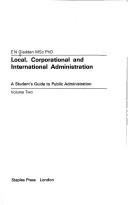
ISBN: 0286110024 Year: 1972 Publisher: London Staples press
Abstract | Keywords | Export | Availability | Bookmark
 Loading...
Loading...Choose an application
- Reference Manager
- EndNote
- RefWorks (Direct export to RefWorks)
Book
ISBN: 0531053628 0531055701 Year: 1975 Publisher: New York (N.Y.): New viewpoints
Abstract | Keywords | Export | Availability | Bookmark
 Loading...
Loading...Choose an application
- Reference Manager
- EndNote
- RefWorks (Direct export to RefWorks)
Book
ISBN: 2800800445 Year: 1991 Publisher: Brussel Vander
Abstract | Keywords | Export | Availability | Bookmark
 Loading...
Loading...Choose an application
- Reference Manager
- EndNote
- RefWorks (Direct export to RefWorks)
Book
ISBN: 9789461173249 Year: 2022 Publisher: Brussel ASP
Abstract | Keywords | Export | Availability | Bookmark
 Loading...
Loading...Choose an application
- Reference Manager
- EndNote
- RefWorks (Direct export to RefWorks)
Diplomacy aims to make the world a somewhat better place. And for that to happen, we need thoughtful people, which most diplomats happen to be. But thought alone does not carry us very far. Thought needs to result in action. It is not thinking about the world but changing it that makes for an effective diplomat. Diplomacy is not a science, but a practice. It is what diplomats do. They write reports, make public speeches, debate, negotiate, preside over meetings … For all that they need diplomatic skills. This book is about these skills. Looking at them more closely, we soon realise that these are skills upon which most of us, diplomats and non-diplomats, rely most of the time. Somehow, we are all diplomats. Diplomatic Skills. The basics will be of interest to students, diplomats, lawyers, businesspeople, government officials, military officers, lobbyists, journalists and ultimately to everybody who wishes to acquire the communication skills that allow them to smoothly navigate through life, both professional and private.
255 Internationale organisaties --- 240 Internationale politiek --- diplomatie --- Diplomatie --- Internationale politiek --- #SBIB:327.6H10 --- Diplomatieke, consulaire en internationale openbare functies --- Social psychology --- International relations. Foreign policy --- Mass communications
Book
ISBN: 0631154868 Year: 1987 Publisher: New York (N.Y.): Blackwell
Abstract | Keywords | Export | Availability | Bookmark
 Loading...
Loading...Choose an application
- Reference Manager
- EndNote
- RefWorks (Direct export to RefWorks)
341.17 EC --- Alienation (Philosophy) --- Diplomacy --- #SBIB:327.6H10 --- |03630/B --- History --- International relations --- Estrangement (Philosophy) --- Philosophy --- Europese Gemeenschappen--EC --- Diplomatieke, consulaire en internationale openbare functies --- Diplomacy. --- 341.17 EC Europese Gemeenschappen--EC --- Alienation (Philosophy).
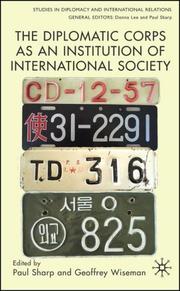
ISBN: 9780230001657 0230001653 Year: 2007 Publisher: Basingstoke Palgrave Macmillan
Abstract | Keywords | Export | Availability | Bookmark
 Loading...
Loading...Choose an application
- Reference Manager
- EndNote
- RefWorks (Direct export to RefWorks)
International relations. Foreign policy --- Diplomacy. --- Diplomatie --- Diplomats. --- International relations. --- #SBIB:327.6H10 --- Coexistence --- Foreign affairs --- Foreign policy --- Foreign relations --- Global governance --- Interdependence of nations --- International affairs --- Peaceful coexistence --- World order --- National security --- Sovereignty --- World politics --- History --- International relations --- Statesmen --- Diplomatieke, consulaire en internationale openbare functies --- Diplomats --- Diplomacy
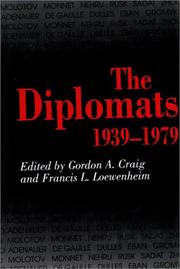
ISBN: 0691036136 0691194467 Year: 1994 Publisher: Princeton (N.J.) Princeton university press
Abstract | Keywords | Export | Availability | Bookmark
 Loading...
Loading...Choose an application
- Reference Manager
- EndNote
- RefWorks (Direct export to RefWorks)
This volume offers a unique perspective on a turbulent and dangerous age by focusing on the activities and accomplishments of its diplomats. Its twenty-three interconnected essays discuss the politics of ambassadors, foreign ministers, and heads of state from Acheson and Adenauer to Sadat and Gromyko, as well as the special problems of the professionals in the foreign offices and the role of the media in modern diplomacy. Among its contributors are such distinguished international scholars as Akira Iriye, Michael Brecher, Stanley Hoffmann, W.W. Rostow, and Norman Stone.Expanding the field of inquiry covered by its acclaimed predecessor, The Diplomats, 1919-1939, which concentrated on Europe and the coming of the Second World War, these essays showcase the major diplomatic practitioners of the period against the broader background of the problems and crises that confronted them-among others, the Polish question at the end of World War II, the onset of the Cold War, the defeat of EDC in 1954, the Suez crisis, Kruschchev's Berlin note in 1958, the Middle East War of 1967 and the oil shock of 1973, the Iranian revolution, and the Soviet invasion of Afghanistan. This account of the pendular swing from crisis and detente and back again is given a global perspective by careful treatment of the diplomacy of new nations like India, Communist China, and Israel, and the transformation of the Middle East and Japan.Among the new perspectives offered here are Geoffrey Warner's critical view of Ernest Bevin's attitude toward the United States, John Lewis Gaddis's judgment of Henry Kissinger's detente policy, W.W. Rostow's analysis of the diplomatic method of Paul Monnnet, Rena Fonseca's assessment of Nehru's policy of nonalignment, Shu Guang Zhang's fresh look at the relationship between Zhou Enlai and Mao, and Paul Gordon Lauren's critique of U.N. crisis management from Trygve Lie to Perez de Cuellar. Highly original also are Steven Miner's portrait of Molotov, Michael Brecher's pioneering study of the diplomacy of Abba Eben, and James McAdams's analysis of German Ostpolitik.Originally published in 1994.The Princeton Legacy Library uses the latest print-on-demand technology to again make available previously out-of-print books from the distinguished backlist of Princeton University Press. These editions preserve the original texts of these important books while presenting them in durable paperback and hardcover editions. The goal of the Princeton Legacy Library is to vastly increase access to the rich scholarly heritage found in the thousands of books published by Princeton University Press since its founding in 1905.
World history --- anno 1900-1999 --- Diplomacy --- -Diplomats --- -World politics --- -#SBIB:327.6H10 --- Colonialism --- Global politics --- International politics --- Political history --- Political science --- Eastern question --- Geopolitics --- International organization --- International relations --- Statesmen --- History --- -Biography --- Diplomatieke, consulaire en internationale openbare functies --- World politics --- 1945 --- -Statesmen --- 20th century --- Diplomats --- Diplomats - History - 20th century. --- #SBIB:327.6H10 --- Coexistence (World politics) --- Peaceful coexistence --- Biography --- HISTORY / United States / 20th Century.
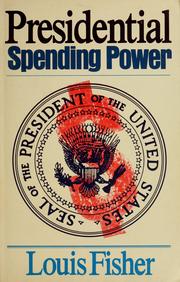
ISBN: 0691617694 0691644799 0691021732 1400868343 9781400868346 0691075751 9780691075754 9780691021737 Year: 1975 Publisher: Princeton, N.J. Princeton University Press
Abstract | Keywords | Export | Availability | Bookmark
 Loading...
Loading...Choose an application
- Reference Manager
- EndNote
- RefWorks (Direct export to RefWorks)
Each year billions of dollars are diverted by the President and his assistants from the purposes for which Congress intended them. Billions more are used in confidential and covert ways, without the knowledge of Congress and the public. Here is the first account of how this money is actually spent.Louis Fisher writes: "When it comes to the administration of the budget, we find nothing that is obvious, very little that is visible. Our priorities here are peculiar. We fix upon the appropriations process, watching with great fascination as Congress goes about its business of making funds available to agencies. What happens after that point -the actual spending of money-rarely commands our attention."To unravel the mystery, Louis Fisher has investigated different forms of discretionary action: the transfer of funds that initially financed the Cambodian incursion; impoundment during the Nixon administration; covert financing; the reprogramming of funds; and unauthorized commitments. He describes each of these devices in operation and provides the historical background of Presidential spending power. In conclusion Louis Fisher presents a cogent and timely analysis of what can be done to improve Congressional control. Sufficient control, he maintains, cannot be achieved merely through the appropriations process, and he makes important recommendations designed to preserve discretionary authority while improving Congressional supervision.Originally published in 1975.The Princeton Legacy Library uses the latest print-on-demand technology to again make available previously out-of-print books from the distinguished backlist of Princeton University Press. These editions preserve the original texts of these important books while presenting them in durable paperback and hardcover editions. The goal of the Princeton Legacy Library is to vastly increase access to the rich scholarly heritage found in the thousands of books published by Princeton University Press since its founding in 1905.
Budget --- Finance, Public --- Specie payments --- United States --- Appropriations and expenditures. --- #SBIB:327.6H10 --- #SBIB:35H6030 --- Diplomatieke, consulaire en internationale openbare functies --- Bestuur en beleid: nationale en regionale studies: Verenigde Staten --- Political systems --- Public expenditure --- Planning (firm) --- Appropriations and expenditures --- Budget - United States --- Finance, Public - United States --- United States - Appropriations and expenditures --- United States of America
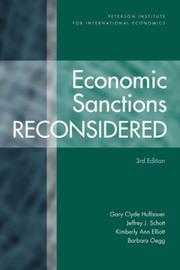
ISBN: 9780881322682 0881322687 9780881324310 0881324310 9780881324129 0881324124 9780881324082 9780881324075 0881324078 0881324086 9786611125141 0881324825 1281125148 1435616421 9781435616424 9780881324822 6611125140 6611125140 Year: 2009 Publisher: Washington, DC Peterson Institute for International Economics
Abstract | Keywords | Export | Availability | Bookmark
 Loading...
Loading...Choose an application
- Reference Manager
- EndNote
- RefWorks (Direct export to RefWorks)
Economic sanctions. --- Economic sanctions --- #SBIB:33H071 --- #SBIB:327.6H10 --- Sanctions, Economic --- Economic policy --- Sanctions (International law) --- International economic relations --- Economische internationale betrekkingen --- Diplomatieke, consulaire en internationale openbare functies --- Law and legislation --- Economic sanctions -- Case studies. --- World history --- anno 1900-1999 --- E-books
Book
ISBN: 036300100X 9780363001005 Year: 1977 Publisher: London Triton books
Abstract | Keywords | Export | Availability | Bookmark
 Loading...
Loading...Choose an application
- Reference Manager
- EndNote
- RefWorks (Direct export to RefWorks)
History of Eastern Europe --- Internal politics --- Russian Federation --- Diplomats --- Biography --- Eeman, Harold, --- Soviet Union --- Description and travel --- -Diplomats --- -#SBIB:327.6H10 --- #SBIB:35H6020 --- 323 <47> --- Statesmen --- Diplomatieke, consulaire en internationale openbare functies --- Bestuur en beleid: nationale en regionale studies: Oost-Europa --- Binnenlandse politiek--Rusland. Sovjet-Unie --- Eeman, Harold --- -Description and travel --- 323 <47> Binnenlandse politiek--Rusland. Sovjet-Unie --- Russia --- #SBIB:327.6H10 --- Description and travel. --- Diplomats - Belgium - Biography --- Diplomats - Soviet Union - Biography --- Eeman, Harold, - 1893 --- -Soviet Union - Description and travel --- -Soviet Union
| Listing 1 - 10 of 17 | << page >> |
Sort by
|

 Search
Search Feedback
Feedback About UniCat
About UniCat  Help
Help News
News